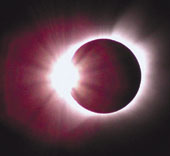 |
Confidence personified
Einstein was so sure about the accuracy of his theory of general relativity that he went to sleep early on May 29, 1919, the day two teams of British physicists in Principe Island in West Africa and Sobral in Brazil tested it during a total solar eclipse. When his stepdaughter Ilse Rosenthal-Schneider asked him later how he would have reacted if the results contradicted his ideas, he said, “I would feel sorry for the dear Lord. The theory is correct anyway.”
 |
Reluctant father
Einstein is often called the ‘reluctant father of black holes’. For, though the physicist Karl Schwarzschild argued that the possibility of existence of these cosmic monsters was lurking in the equations of general relativity, Einstein wrote a paper, as late as 1939, trying to prove that Schwarzschild was wrong.
Big Bang-baiter
The Big Bang ? or the cataclysmic birth of this cosmos in a huge explosion, before which time simply didn’t exist ? is now well entrenched in human wisdom. But it wasn’t Einstein who first got this idea. A rather sad miss, as his own equations seemed to hint at this kind of a momentous birth of the Universe unequivocally. When the Belgian priest Georges Lemaitre drew his attention to this in 1927, he dismissed this obscure physicist’s ideas. Had Einstein followed Lemaitre’s thinking, he could have predicted the expansion of the Universe more than a decade before it was actually discovered.
 |
Trademark wit
Regularly urged by newsmen as well as laypersons to explain the essence of special relativity, Einstein invoked his trademark wit to respond to the request. “An hour sitting with a pretty girl on a park bench passes like a minute, but a minute sitting on a hot stove seems like an hour,” he remarked, illustrating ? jokingly, of course ? the fact that time flowed with unequal speeds for various people. Time’s plasticity ? moving fast for someone staying put, but slowly for others who are in motion ? is rightly explained by the tale of the twins, one of whom goes for a space travel. When he comes back, he’s surprised to find his brother’s much older than him!
 |
Quantum heretic
On March 17, 1905 ? three days after his 26th birthday ? Einstein submitted his first paper of that miraculous year to the leading German journal Annalen der Physik. The paper was dubbed “very revolutionary” by him. It earned him the 1921 Nobel Prize in physics, and, indeed, also helped usher in the revolutionary concept of quantum mechanics. Einstein, however, didn’t like its counter-intuitive conclusions; for example, a single particle being located at several places simultaneously. So while visiting his friend Max Born’s lab in Berlin overlooking a lunatic asylum, he said of the inmates roaming there: “They’re the happiest lot in the world; they don’t have to bother about quantum mechanics!”
 |
Bomb scare
Einstein wrote, at the behest of fellow physicist Leo Szilard, a letter to US President Franklin Delano Roosevelt for making an atom bomb, and the weapon of mass destruction made use of his formula E=mc2. However, he himself initially wasn’t sure it could be built, and said the job was as tough as “shooting birds in the dark in a country where there are only a few birds.”










